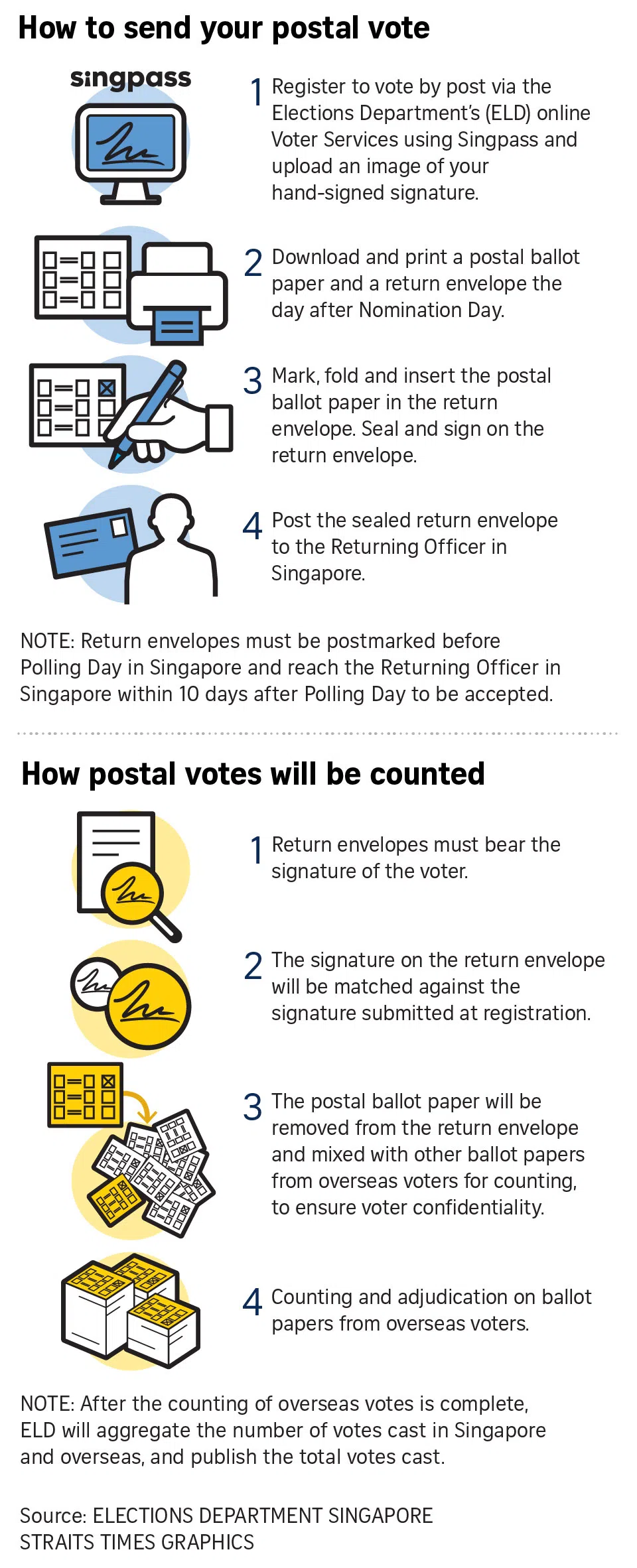Overseas Singaporeans, nursing home residents welcome changes to make voting easier for them
Sign up now: Get ST's newsletters delivered to your inbox

At GE2020, there were 6,570 registered overseas voters, with 4,794 of them casting their ballots.
PHOTO: LIANHE ZAOBAO
SINGAPORE - Musician See Chee-Hang, 36, has not voted since 2011 because his nearest polling station is an eight-hour drive away and it is difficult for him to get time off work to travel there.
Mr See, who lives and works in Charleston, South Carolina, in the United States, is among the Singaporeans living overseas who will be able to vote by post in the 2023 Presidential Election, after new laws were passed by Parliament on Monday.
Before, Mr See – who is also a music teacher – would have to take a day or two off work to go to Washington to vote, a situation made more difficult by the time difference between Singapore and the US, which meant Polling Day usually landed on a weekday for him, making it harder to take leave.
He said: “I’m confident that postal voting will go without a hitch.”
Before the changes, overseas voters had to travel to polling stations in specified places to vote, a situation that resulted in some Singaporeans being unable to vote when Covid-19 travel restrictions set in across the globe in 2020.
At GE2020, there were 6,570 registered overseas voters, and 4,794 of them cast their ballots. About 200,000 Singaporeans are living overseas.
Another voter benefiting from the change is Hawaii-based astrophysicist Joel Ong, 32, whose nearest polling station is a five-hour and 45-minute flight away in San Francisco.
Dr Ong, who is doing research at the University of Hawaii, said: “I am very pleased; this is a great change.
“The ability to vote by post means I won’t have to take two days off from work to exercise my right to vote... and the timelines given by the Elections Department seem very reasonable. The real test, however, will be how it works for this Presidential Election, assuming there is no walkover.”
The new laws say that to be accepted, postal votes have 10 days to reach Singapore after Polling Day, which Dr Ong says is about the right amount of time for mail to travel, in his experience.
Others are not swayed. Human resources worker Daphine Choo, 30, has been living in Japan for 5½ years but has yet to vote. She said: “I feel very removed from current affairs in Singapore, and post still feels less convenient than using the Internet to vote, which I would consider if it was an option.”
The new laws will also ease voting for nursing home residents.
The Elections Department (ELD) will roll out a pilot where polling arrangements like mobile voting booths will be made for nursing homes with more than 50 voters.

This will involve 25 to 30 nursing homes and reach out to over 2,000 voters, about two-thirds of registered voters currently residing in nursing homes.
Thye Hua Kwan Nursing Home chief executive officer Ardi Saban Hardjoe told The Straits Times that the home has been in discussion with the ELD, and if it qualifies for the pilot, with about 50 residents – which is about 17 per cent of its residents – eligible to vote.
Mr Ardi said: “These new arrangements will benefit the residents because they will bring the polling station to them, rather than them having to travel to different polling stations based on their NRIC address.”
In the past, the nursing home would have to arrange for transportation for some residents to go to their assigned polling stations to vote, he said. In some cases, their families would also help to facilitate voting. Such arrangements required significant manpower and resources, he added.
A resident who wanted to be known only as Mr Sum, 60, who has been at the home since 2017, said mobile voting stations would be a great benefit.
Mr Sum, who uses a wheelchair, said: “All the old folks here need help, so this would be so much better. Saves manpower and time too.”
He voted in GE2020 using transport provided by the nursing home. He added that being in a wheelchair meant that transport and staff were always needed to help him get to a polling station.
More can be done to help nursing home residents, such as greater education and awareness about the pilot and the different candidates, said Mr Ardi.
He added: “Residents in the nursing home may not have access to a lot of information and media channels before making up their minds. Many are not able to attend the hustings and rallies.
“It might also help if the polling booth can be brought to the residents’ bedside to further facilitate voting.”



